Secretary of State Mike Pompeo says the U.S. will organize the free world, while alienating and undermining the free world; he extols democracy, while aiding and abetting its destruction at home; and he praises the Chinese people, while generalizing about the ill intent of Chinese students who want to come to America, argues Thomas Wright. This piece originally appeared in The Atlantic.
Secretary of State Mike Pompeo gave one of the most surreal speeches of the Donald Trump presidency at the Richard Nixon Presidential Library and Museum in Yorba Linda, California, on Thursday. In his speech, titled “Communist China and the Free World’s Future,” he declared the failure of 50 years of engagement with China and called for free societies to stand up to Beijing.
I am sympathetic to the argument. I wrote a book in 2017 about how Western hopes that China would converge with the liberal international order have failed. I have argued for almost two years that when Trump leaves office, the United States should put the free world at the center of its foreign policy.
Unfortunately, Pompeo, like his targets in Beijing, is engaged in doublespeak whereby he offers win-win outcomes, but his words are at odds with his actions. He says the U.S. will organize the free world, while alienating and undermining the free world; he extols democracy, while aiding and abetting its destruction at home; and he praises the Chinese people, while generalizing about the ill intent of Chinese students who want to come to America.
Pompeo is also ultra-loyal to a president who cares not one whit for democracy, dissidents, freedom, or transparency overseas. Trump’s long track record on this is well documented, and it has defined his personal approach to China.
On June 18, 2019, Trump spoke with Chinese President Xi Jinping by phone and told him he would not condemn a crackdown in Hong Kong. On August 1, Trump told the press that the unrest in Hong Kong was between Hong Kong and China “because Hong Kong is a part of China. They’ll have to deal with that themselves. They don’t need advice.”
In his book, the former national security adviser John Bolton wrote that on two separate occasions, Trump told Xi that he “should go ahead with building the [concentration] camps in Xijiang, which Trump thought was exactly the right thing to do.” Pompeo said nothing about these revelations, although he called Bolton a traitor.
And in January and February of this year, Trump infamously praised Xi’s response to the COVID-19 pandemic, even though the World Health Organization was privately alarmed by Beijing’s actions and its lack of transparency (it praised China publicly in the hopes of coaxing it into cooperation). The Trump administration would have known this and could have built a coalition to increase pressure on China, but instead it ignored the behavior.
For three and a half years, senior members of the administration have tried to downplay Trump’s words as if they don’t make policy. But they do, especially if consistently expressed. His serial dismissal of the values of the free world has a real impact. Pompeo has some nerve to now claim that what is upside down is right side up.
An ideological struggle is underway between China and free societies, but Trump is on the wrong side. The Chinese Communist Party wants a tributary international system where smaller countries are deferential to larger powers, instead of a rules-based international order where small countries enjoy equal rights. The CCP also sees no place for universal rights or global liberal norms, and wants to ignore the principles of open markets to pursue a predatory mercantilist economic policy. So does Trump. Indeed, Trump never speaks in terms of a competition of systems between democracy and authoritarianism. He rarely criticizes authoritarian governments on their human-rights records. He has done little to press China to free the Canadian hostages. He and Pompeo sought to rehabilitate Crown Prince Mohammed Bin Salman of Saudi Arabia after the brutal murder of the journalist Jamal Khashoggi. He has embraced the Hungarian autocrat Viktor Orbán as he shredded his country’s democratic institutions. The only countries that need to fear a reprimand from Trump on human rights are those led by left-wing Latin American authoritarians—everyone else gets a pass.
Meanwhile, Trump and Pompeo have turned social distancing into a diplomatic doctrine. The subject of Russian election interference has never featured on the agenda of NATO summits. Officials told me they wanted to but worried that Trump would walk out in protest. The administration repeatedly rejected requests from Europe to work together on China until a few weeks ago. The Trump administration also sees its traditional allies — countries that belong in the free world — as economic competitors. If other countries’ economies are doing badly, the U.S. looks better, or so they think. With that type of mindset, there is no incentive to think deeply about how to tackle our shared challenges.
Even discussing the ideological component of the U.S.-China rivalry is a delicate matter. I have lost count of the number of times European diplomats have told me they want to work with the U.S. on China but get nervous and reluctant whenever ideology is broached.
In his speech, Pompeo painted a picture of a Chinese leader driven by Marxism-Leninism and executing a plan to fulfill his “decades-long desire for global hegemony of Chinese communism.” Ideology is at play in the U.S.-China rivalry, but in a much more complicated and nuanced way than Pompeo suggests. The U.S. and China both offer different social and governance models — one is generally free and open and the other is authoritarian and closed. Each threatens the other, not necessarily because of the foreign-policy choices the leaders make, but because of what the governments are at their core. Beijing believes that the freedom of the press, the internet, social media, NGOs, economic interdependence, and exchange programs all have the potential to undermine their regime. They are not wrong. Indeed, many Americans saw this as a positive side effect of engagement.
Many Americans rightly understand that China’s authoritarian model has negative externalities that threaten U.S. interests and freedoms. Tools of repression domestically find their way overseas. Beijing seeks to censor all criticism of its regime by coercing other governments, companies, and individuals. It sucks up data on foreign citizens. It employs mercantilist techniques to pursue dominance of new technologies. China is actively seeking to eviscerate liberal norms around human rights, anti-corruption, and freedom of speech. The regime interferes in democracies to advance its interests.
Neither side can accommodate the other without compromising the essence of its system. Americans would like China to become less repressive, but there is zero chance of that under Xi. China would like the U.S. to respect what it calls its core interests, but this would mean unpalatable concessions that would compromise our values and interests — such as acquiescing in the suppression of free speech. So we are destined for rivalry. The question is how to inoculate the free world against the negative effects of the authoritarian model while also engaging with China on shared interests.
This clash of systems is actually fairly accurately described in parts of the White House’s official strategy on China, which bears the hallmark approach of Matthew Pottinger, the deputy national security adviser. Pottinger is a hawk on China, but he has gained the bipartisan respect of Asia experts and that of U.S. allies, including in Europe, by staying out of the limelight and by making a sophisticated and nuanced version of the case, albeit one that has its own shortcomings and is still inconsistent with Trump’s personal worldview. Pottinger has also engaged in patient, low-key diplomacy on China in Europe from early on in the administration and avoids any hectoring or partisanship.
Pompeo’s account, by contrast, is a Manichean politicized caricature. For instance, consider the difference between Pottinger’s document and Pompeo’s speech on Chinese students. The official strategy says:
Chinese students represent the largest cohort of foreign students in the United States today. The United States values the contributions of Chinese students and researchers. … The United States strongly supports the principles of open academic discourse and welcomes international students and researchers conducting legitimate academic pursuits; we are improving processes to screen out the small minority of Chinese applicants who attempt to enter the United States under false pretenses or with malign intent.
At the Nixon Library, the sum total of what Pompeo said about Chinese students was the following:
We know too, we know too that not all Chinese students and employees are just normal students and workers that are coming here to make a little bit of money and to garner themselves some knowledge. Too many of them come here to steal our intellectual property and to take this back to their country.
In the first, the U.S. welcomes the Chinese people to its shores and recognizes that a small minority could have ill intent. The second is torn right out of the Trump “I assume some are good people” playbook.
It’s a subtle but important difference that repeats itself again and again. The official strategy talks about China’s hegemonic aspirations in Asia, particularly in the maritime domain, and not “global” domination of “Chinese communism.” It says that “the United States stands ready to welcome China’s positive contributions” and mentions several examples and ways of going about that. Pompeo is utterly dismissive of any cooperation or engagement. Some, he says,
are insisting that we preserve the model of dialogue for dialogue’s sake. Now, to be clear, we’ll keep on talking. But the conversations are different these days. I traveled to Honolulu now just a few weeks back to meet with Yang Jiechi. It was the same old story—plenty of words, but literally no offer to change any of the behaviors.
That was as constructive as it got.
Pompeo’s tirade will discredit the case for competition with China among allies, in Asia and Europe, who are petrified of a full-blown Cold War where the U.S. and China have no interest in diplomacy. He couldn’t resist a thinly veiled, and inevitably counterproductive, sideswipe at German Chancellor Angela Merkel, who is under pressure to take a tougher stance on China, saying cryptically,
We have a NATO ally of ours that hasn’t stood up in the way that it needs to with respect to Hong Kong because they fear Beijing will restrict access to China’s market. This is the kind of timidity that will lead to historic failure, and we can’t repeat it.
By far the biggest problem with Pompeo, or the administration, invoking the free world is that he said nothing about the free world itself. Free societies are in trouble. As the NGO Freedom House has documented, the world has become less free over the past four years, due in large part to illiberal forces within democracies. Many democracies also struggle to cope with fundamental challenges, including inequality, racial injustice, the automation of work, and new technologies such as artificial intelligence. Free societies also face the very real threat of political interference from authoritarian states and networks of corruption.
Getting serious about defending the free world has to start with restoring the rule of law and democracy at home and seriously examining what it will take to remain free and democratic in the decades to come. Instead of tackling this problem, the Trump administration has thrown more fuel on the fire raging inside the free world. Trump has said he may not accept the results of the forthcoming election. He has claimed that mail-in voting, a staple of American democracy, is fraudulent. He has sent troops into American cities against the wishes of their mayors. And he has called for Russia and China to interfere in the election process.
America is a work in progress. The U.S. is entitled to carry the banner of freedom, as it did in the Cold War, even as it wages the struggle for freedom at home. But it is quite another matter for an administration that is actively undermining American democracy to claim the mantle of the free world.
A different administration has an opportunity to put the free world at the heart of its strategy. It would involve working with other free societies to modernize our systems of governance so they are collectively resilient to shocks—whether they are financial, environmental, political, or public-health-related. This will, by necessity, involve major changes domestically. It means tackling international networks of oligarchs and corruption that exploit a country’s openness in order to penetrate their systems and distort their democracy. It also allows for a robust national and international conversation about what a free society means in the modern world—one that should include voices from across the political spectrum.
Competing with China is an important component of the free-world strategy but only one part, and the competition is not an end in itself. Some critics will still worry that talking about the free world will bring about a Cold War with China, dividing the world in two. But this fear is misplaced. Kelly Magsamen of the Center for American Progress recently put it succinctly. “Rather than organizing U.S. foreign policy purely around competition with China,” she told me, “we should be organizing it around our democratic allies with the goal of strengthening and catalyzing the free world. That’s a far more affirmative theory of the case that would better reflect American values, play to our comparative advantages, and frankly get better collective results.” That strategy is the way to get allies and Americans on board with a competition between governance systems because it recognizes that the challenge comes from within and is something the U.S. should do even if there were no competition with China.

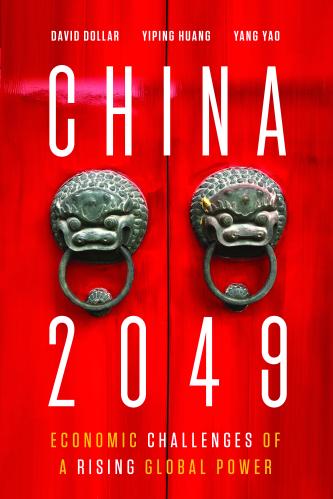
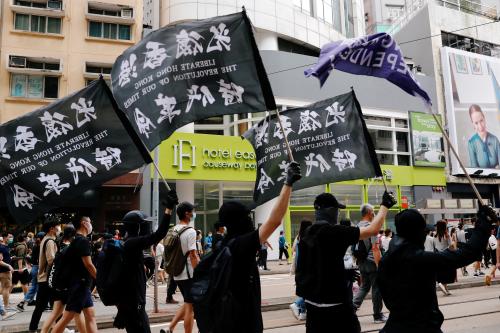
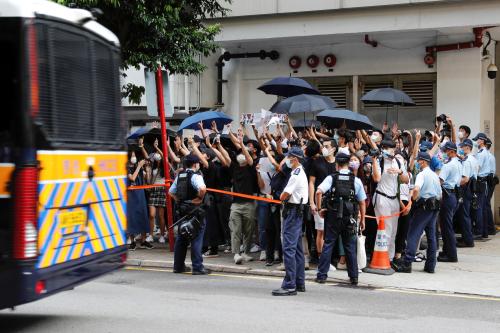
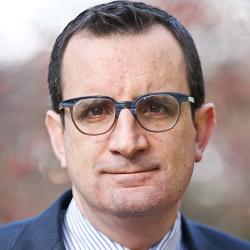
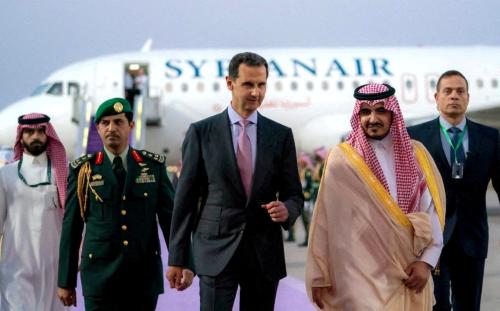
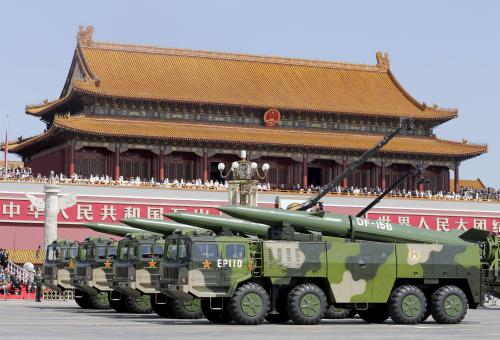

Commentary
Pompeo’s surreal speech on China
July 27, 2020